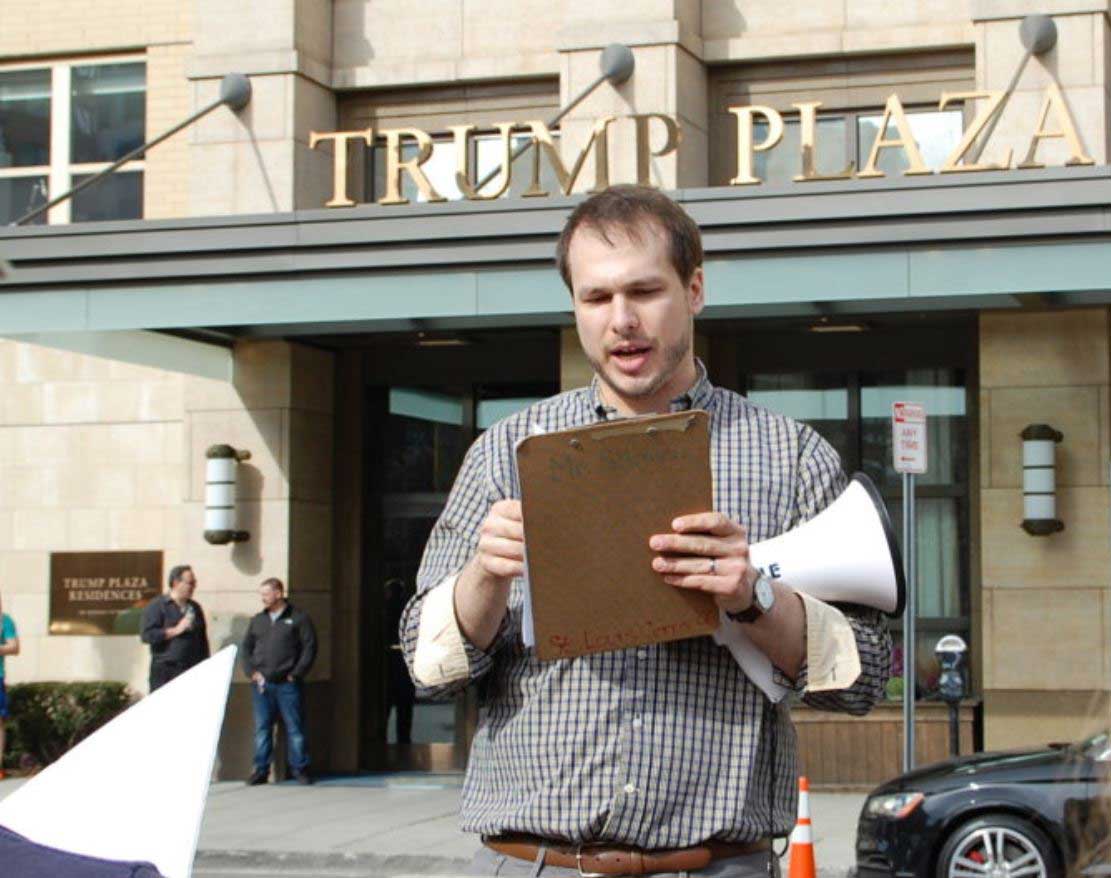Editor’s Note: This is part two of an ongoing interview series with Jersey City’s nine city councilpeople. Jersey Digs has invited all city council members to participate in the Q&A about their outlooks on topics ranging from development and crime to transportation and the tax revaluation for their respective wards. The interviews have been edited and condensed for clarity and length.

Ward E, which encompasses almost all of Downtown Jersey City from I-78 to the Hudson River, has been the epicenter of development going back decades. While it is home to many of the city’s historic districts, a building boom has transformed former industrial areas along the waterfront into high-end residential towers. And the growth isn’t stopping anytime soon.
At the same time, affordability among Downtown’s long-time residents has become a concern, particularly due to an overdue property tax revaluation — the city’s first reval since 1988 — that will be completed this year. (The city released preliminary results in December.) Potential tax and rent increases have caused some Ward E residents angst, while traffic, population, and construction congestion has undoubtedly gotten worse.
James Solomon is the newly-elected councilperson for Ward E, winning a runoff election on December 5th. Solomon, who ran as an independent, recently sat down with Jersey Digs to flesh out his positions and state his hopes for his upcoming term.
Q: What issues will be your top 3 priorities for Ward E’s residents?
A: The first and biggest one is dealing with the property reval, which I think is going to be particularly painful Downtown. The mayor’s office has released preliminary data suggesting property values have gone up 74% in Paulus Hook and jumped 67% in Van Vorst, and on average there’s been an over 50% property value increase in Ward E as a whole. I want our response to be as robust as possible. We can’t stop it, but we can make sure people have access to financial planners and have as much information as possible.
My second priority would be safe streets, which is incredibly important Downtown. I will be advocating for some short-term improvements like making Jersey Avenue and the intersection of Grand and Columbus safer, but long term I’d like to see a “complete streets” philosophy embraced, which makes roads safer for all users including bikers, pedestrians, and car drivers.
The third major focus would be on development and specifically getting more community benefits out of the development process. That could look like giving out smaller abatements so there’s more tax revenue coming to the city, and getting more significant community givebacks from builders. Downtown has some of the most valuable real estate in the country, and I think that we can do a significantly better job at getting benefits back to us.
Q: Are you in favor of abatements for Downtown properties if there are developer givebacks?
A: I believe that abatements can be justified if there are significant community returns, but that’s the key. We have to be rigorous about the financial analysis of those givebacks, and I think other cities are ahead of where we are in terms of that point. For example, we desperately need more schools Downtown. P.S. 16 is at 35 kids per classroom, and we aren’t getting more school space through the state. If we are going to get new schools Downtown, it must come through private development and likely has to come through the abatement process.
Q: You’ve advocated throughout the campaign for smart growth. What changes do you think the city can make on their end to facilitate that vision?
A: It starts with the city’s Master Plan. It’s pretty clear that the city’s growth is not connected to the current Master Plan, which was supposed to be redone five or six years ago and wasn’t. As a result, much of the current development happens on an ad hoc or case-by-case basis. I’m not saying we should have zero flexibility in our regulations, but we should have a larger vision that we are adhering to.
The second action would be taking a look at the city’s redevelopment plans. Several of them allow huge towers as-of-right, and we can’t just keep doing that. We have to find our way back from that path given the strain on our infrastructure. I was careful during the campaign not to say I was against growth or wanted to shut down all development, but I do want to make sure that the process is smarter and we get benefits coming back to the community.
Q: Given that Downtown is probably the most booming area in terms of construction, what is your biggest concern development-wise in your ward?
A: At a minimum, the amount of planned growth in the next five years, given the stress on infrastructure, is concerning. A private company recently put together an inventory of planned new development Downtown for the years 2016-2020. There are over 8,000 units planned, and assuming two residents per unit, that will add roughly 16,000 people to Downtown over the next 5 years. That’s a huge increase to the area, which has about 60,000-70,000 residents already here. Do we have the infrastructure for that? I don’t think we do. Our roads are already congested, our PATH train is at capacity, and it’s getting worse.
I’m also concerned about any new major development that doesn’t have any affordable housing in it. I don’t believe Liberty Harbor has any affordable housing component to it, and that’s concerning to me.
Q: Speaking of keeping Downtown affordable, would you be in favor of expanding rent control laws?
A: The biggest thing we need to do is enforce the existing laws on the books. When knocking on doors of buildings that were clearly rent-controlled under the law during the campaign, I would meet tenants who would say to me “we don’t have rent control” when they definitely did.
The work JC Together did exposing Trendy Management’s business practices demonstrates that there are clear holes in the city’s enforcement of rent-control laws. One of the things I would like to do in the first year is a door-to-door audit of every rent-controlled unit Downtown to make sure tenants have been informed of their rights and see if we can figure out the scale of the problem.
Q: Is there anything specific in the rent-control laws you’d like to see strengthened?
A: Rent control is key to keeping Downtown affordable going forward. I want to do a little more research, but I would strongly consider changes that would make buildings under four units subject to rent-control laws, as they currently are not.
Q: One of the burgeoning areas of Ward E is along the Hoboken border, which is somewhat disconnected from the rest of Downtown. Transportation-wise, what do you think can be done to better connect the neighborhood to the rest of the ward?
A: One of the big pieces is partnering with residents of Holland Gardens to create bus service for the area, which is currently lacking. It’s a complicated issue, but it highlights the inequitable nature of development in Jersey City. The Cast Iron Lofts development is literally across the street and those residents get a private shuttle service to the PATH.
The long-term ideal is to bring NJ Transit to the table to add a bus line, and also to advocate for a Light Rail station between Newport and Hoboken’s 2nd Street. I teach at NJCU, and I take the Light Rail system regularly to their Jersey City and Union City campuses. It’s great, super convenient, and I’d strongly support expanding it.
Another way to better connect the neighborhood would be establishing safer corridors. Many students walk from Holland Gardens to Cordero School, and they are crossing the two large access highways of I-78 to do so. I want to make sure there’s a safe passageway for those kids.
Q: What do you think the city can do to reduce congestion on the roads?
A: It’s a tough situation, and it’s why development ends up getting a lot of community opposition. People reasonably say if a developer is building without parking, they’re creating more traffic. But if you build one parking space in a development for every unit, then everybody brings their cars. We’re in this Catch-22 situation where there’s no good solution. That reality gets to the lack of the master plan and the lack of development with a strategic vision.
I believe we need to build density in a way to encourage people not to have cars here. Another solution goes back to the “complete streets” system that encourages non-vehicular travel. Jersey City currently has no protected bike lanes, and building a protected bike lane network will give people a safe option of getting around the city without a car.
Q: One of your proposals during the campaign advocated for something called a ‘rolling reval.’ Can you explain what that entails and why you think it would benefit residents of your ward?
A: What we’ve seen both this year and during the last reval is that they are politically tough to do. Nobody wants to be the one responsible for raising somebody’s taxes, so we end up having a political hot potato passed around. It screws people over, both those overpaying on taxes for decades and those who maybe were paying less than they should have been, but are now going to be hit with a massive increase.
What the rolling reval does is it gets rid of this political football. It dictates that the city has to perform a reval every five years by revaluating 20% of homes every year over that time. It’s been implemented in some counties across the state and been proposed in Hoboken as well. It makes a ton of sense for Jersey City to do going forward. Everybody gets why the current system doesn’t work, and a rolling reval would allow people to plan ahead so that there’s no surprises.
Q: What are your thoughts on the current “runoff” system Jersey City has for its elections?
A: Well, I have to say I’m in favor of it, otherwise I wouldn’t be here. But in all seriousness, the runoff is important considering the system we have. There’s a huge amount of research that shows that ballot position really matters, and I was listed last on the ballot in the November election. The runoff allows for a better public choice. That being said, campaigning over Thanksgiving was something I wasn’t too keen on. The time frame isn’t ideal, but it is what it is.


